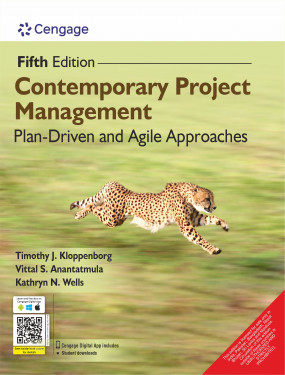Master the proven, traditional methods in project management as well as the latest agile practices with Kloppenborg/Anantatmula/Wells' CONTEMPORARY PROJECT MANAGEMENT, 5E. This edition presents project management techniques and expert examples drawn from successful practice and the latest research. All content reflects the knowledge areas and processes of the 6th edition of the PMBOK® Guide as well as the domains and principles of the 7th edition of the PMBOK® Guide. The book's focused approach helps you build a strong portfolio to showcase project management skills. New features, glossary and an integrated case highlight agile practices, mindset and techniques, while PMP®-style questions prepare you for the new 2021 PMP® certification exam. You also learn to use Microsoft® Project to automate processes.
- Each chapter now includes one or more learning objectives specific to agile. A special section in each chapter examines how topics are treated differently or similarly when using agile practices. This edition also introduces more than 100 agile terms with definitions and descriptions of mindsets and techniques. A large, integrated agile case also spans all 15 chapters to highlight how a real agile project is performed.
- Numerous current examples from industry experts at the beginning of each chapter encourage students to read further. Examples within each chapter flow seamlessly to illustrate specific points, while additional examples from professionals at the end of each chapter demonstrate how organizations combine and apply multiple ideas from the chapter in actual business. The experts who contributed these examples represent leaders in the field with decades of experience and impressive credentials.
- Each chapter now includes 10 PMP®-style questions for a total of 150 practice questions in this edition.
- This edition addresses both versions of the PMBOK® Guide and agile practice in order to help students perform well on the updated PMP® exam.
- The author introduces all concepts using a step-by-step presentation that's consistent with PMBOK® work processes. Students then learn how to automate the project management techniques using Microsoft® Project. Students practice techniques such as identifying and overcoming resource overloads and managing project schedules.
Cengage Digital App includes
Word and Excel Templates
Part I: ORGANIZING PROJECTS
1. Introduction to Project Management
2. Project Selection and Prioritization
3. Chartering Projects
Part II: LEADING PROJECTS
4. Organizational Capability: Structure, Culture, and Roles
5. Leading and Managing Project Teams
6. Stakeholder Analysis and Communication Planning
Part III: PLANNING PROJECTS
7. Holistic Scope Planning
8. Scheduling Projects
9. Resourcing and Accelerating Projects
10. Budgeting Projects
11. Project Uncertainty Planning
12. Project Quality Planning and Project Kick-off
Part IV: PERFORMING PROJECTS
13. Project Procurement and Partnering
14. Determining Project Progress and Results
15. Finishing the Project and Realizing the Benefits
Appendix A: PMP and CAPM Exam Prep Suggestions
Appendix B: PMP Exam Content 2021 Outline with CPM 5e Chapter Coverage
Appendix C: Answers to Selected Exercises
Appendix D: Project Deliverables
Appendix E: Strengths Themes as Used in Project Management
Glossary Terms consistent the PMBOK® 6e and 7e Guides; multiple other PMI Guides and Standards; and current agile practice
Index
Timothy Kloppenborg
Timothy J. Kloppenborg is a professor emeritus of management at Williams College of Business, Xavier University.
Vittal S. Anantatmula
Dr. Vittal Anantatmula is a professor in the College of Business, Western Carolina University (WCU) as well as University of North Carolina.
Kathryn Wells
Kathryn (“Kate”) N. Wells, M.Ed., PMP®, has more than a decade of experience in project management education, having served as lead or co-author of five project management books, including PROJECT MANAGEMENT ESSENTIALS and PROJECT MANAGEMENT FOR ARCHEOLOGY.








